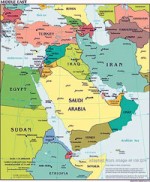After Egypt Revolt, Russia Says Justified in Arab Spring Skepticism

(Moscow Times – themoscowtimes.com – Ivan Nechepurenko – July 5, 2013) As turmoil once again grips Egypt, with the overthrow of Islamist President Mohamed Morsi following days of mass protests in Cairo, one high-ranking Russian official has responded smugly: We told you this would happen.
“The Arab Spring has only led to chaos in Egypt and a bloody foreign-backed drama in Syria, war in Libya, a mess in Tunisia and war in Mali,” Alexei Pushkov, the chairman of the State Duma’s International Affairs Committee, tweeted Thursday.
President Vladimir Putin and other officials have been strongly skeptical about the potential positive effects of the Arab Spring, in which revolutionary demonstrations ousted long-standing dictators in Tunisia, Yemen, Libya and Egypt. With the second coup in Egypt, they see their position strengthened.
But while the renewed upheaval in Egypt will send tremors across the Middle East, foreign affairs pundits said it would have little impact on Russia’s relations with North Africa’s most populous nation.
According to some, the events do not even confirm Russian officials’ views on the Arab Spring at least not yet.
“Nobody knows who will come to power in Egypt now, so the coup does not confirm Russia’s position yet,” said Alexei Malashenko, scholar in residence at Carnegie Moscow Center.
Putin has often reiterated his belief that reckless intrusions into internal affairs in the Middle East are unlikely to bring peace and stability to the region.
“Look at the region as a whole. There is still unrest in Egypt. There is no stability in Iraq, and there is no certainty that it will stay united within its current borders in the future,” the president said last month on RT television.
“In my opinion, this is happening because some people from the outside believe that if the region were to be brought in compliance with a certain idea an idea that some call democracy then peace and stability would ensue. That’s not how it works,” he said.
Putin’s view may stem from Russia’s entrenched and historic suspicion of all kinds of popular participation in politics, according to Georgy Mirsky, a research fellow at the Institute of World Economy and International Relations.
Mirsky said that to understand this perspective, one must look at the Soviet government, in which initiatives from the bottom of the society were perceived negatively because political legitimacy was thought to be “god-given.”
“That is why our government supports the nastiest rulers, such as Saddam Hussein,” he said.
Russia’s relations with Egypt have a long history of ups and downs. During his 1964 visit to Egypt, Soviet leader Nikita Khrushchev awarded the highest Soviet decoration, the golden star of the Hero of the Soviet Union, along with the Order of Lenin, to Egypt’s second president, Gamal Abdel Nasser.
Hosni Mubarak, the Egyptian dictator who was ousted before Morsi was elected, went to pilot training school at Kant Air Base in Soviet Kyrgyzstan.
Now, the intensity of government contacts has decreased and been replaced by a steadily growing flow of Russian tourists, two million of whom filled Egypt’s Red Sea resorts last year.
In an official statement on the situation in Egypt, the Foreign Ministry said Thursday that it recommended that Russian citizens refrain from traveling outside Egypt’s resort zones.
The ministry also said: “We deem it important that all political forces in Egypt exercise restraint and be guided by national interest” in this situation.
During his short tenure as Egyptian president, Morsi found time to pay a visit to Vladimir Putin in his Sochi residence in April, when he declared that he wanted to create a strong political union with Russia.
Geidar Dzhemal, chairman of the Islamic Committee of Russia and a well-known Middle East analyst, said he believed that Morsi’s overthrow would spur instability in the Middle East, especially in the Syrian civil war.
“Morsi behaved like a complete idiot he promised to withstand Washington’s pressure but then turned like a weathercock and began to call on Egyptians to go to Syria and fight against Assad,” he said.
“So the main consequence for Russia here will be that violence in the Middle East will be prolonged, with a civil war in Egypt becoming a real possibility,” he said.
